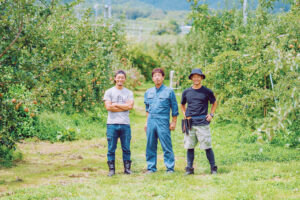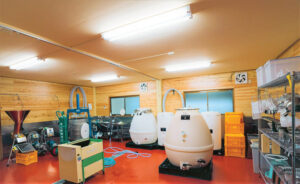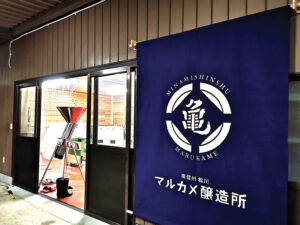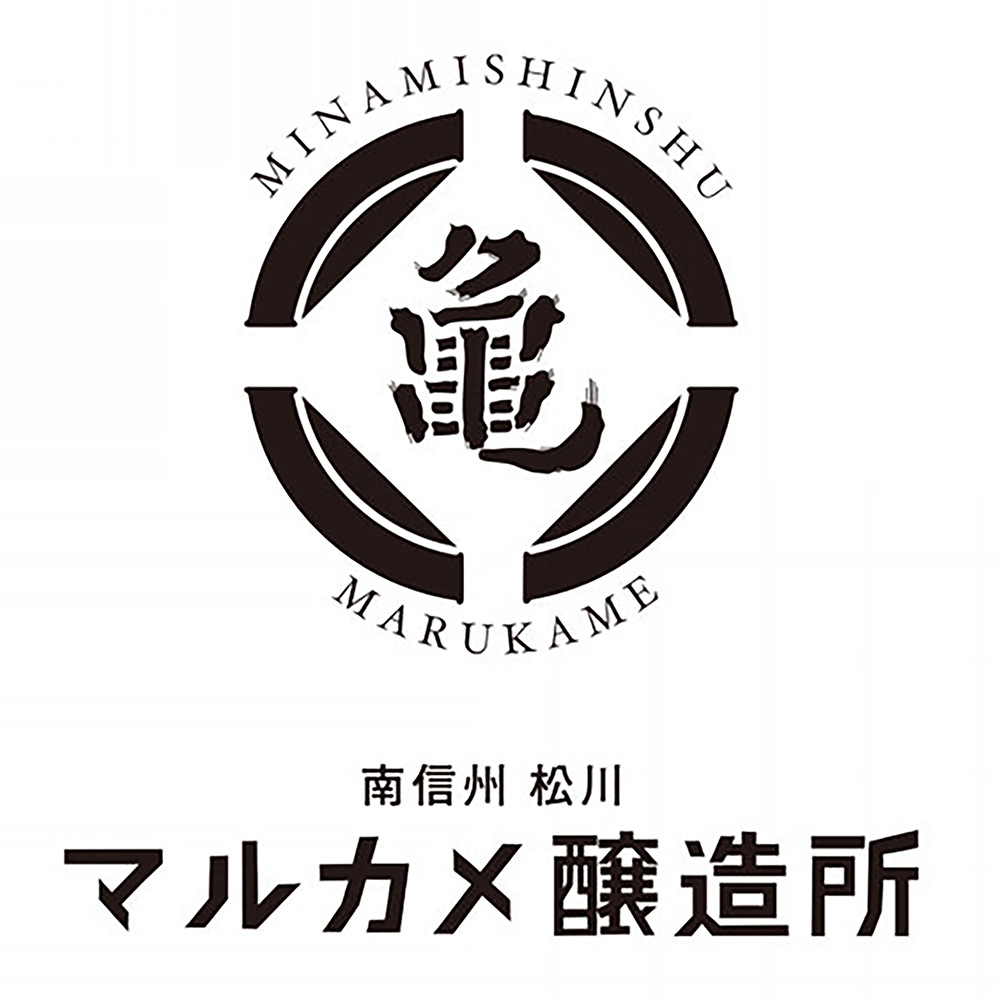According to a 2018 report by Japan’s Ministry of Internal Affairs and Communications, among Japan’s 47 prefectures, 40 had more out-migrants than in-migrants. The country’s competitive labor market means there are plenty of jobs in urban areas, and more young men and women are setting out in search of opportunity. That has been a continuing problem for Japan’s rural areas, which are already struggling with aging and shrinking populations.
Possible solutions to this growing crisis is a popular and heated topic for debate, but we would argue that at least for the regions in Japan that grow apples, cider could be a feasible answer. Our belief is no better exemplified than by newly launched Marukame Cidery operated by the Kitazawa family in Matsukawa, Nagano Prefecture, specifically by brothers Tsuyoshi Kitazawa and Kan Iguchi.
Marukame’s story begins 78 years ago in 1942, during the Second World War, with the establishment of Marukame Kitazawa Noen (Marukame Kitazawa Farm) by the brothers’ great-grandfather. To distinguish themselves from the many other Kitazawas in the area at the time, the great-grandfather adopted Marukame (the Chinese character for turtle in a circle) as part of their name.
The farm originally grew rice and other crops but it soon became apparent that the area was best suited for growing fruit and so they became a fruit farm. This was officially validated by the brothers’ father, Kimihiko, when he changed the name from Marukame Kitazawa Farm to Fruit Garden Kitazawa.
It was the father who started dabbling in alcohol when he ventured into making apple wine five or six years ago by sending his apples to the local winery. When said winery later started making cider, so did he, in the very same manner, via contract production, by delivering his apples to the winery and waiting patiently for the results.
During this period, although the two brothers had been living their own lives, doing their own thing, the Kitazawas stayed in close contact, including discussing matters of the farm. The older brother, Tsuyoshi, was working for a major securities company in Aichi Prefecture, while the younger brother, Kan, was a diving instructor in Kyushu after having gone to a fisheries school there.
The Kitazawas originally had no intention of building their own cidery, but the first seeds were planted upon realizing the number of contract cidermakers in Matsukawa was noticeably growing. And while they thought it was a welcome progression for the town and its apple farmers, it also hinted at a few likely future complications.
Foremost the obvious: if everyone in the area is using the same producer with essentially the same ingredients, then it would make sense that the styles, characteristics, and flavours of the end products were going to be basically the same. Next, there was the issue with the producer’s workload, who was now getting flooded with fresh orders to make cider: the more jobs for them would inevitably mean less say and control regarding their own cider, as theirs would be just another in a long queue of others.
The Kitazawas wanted, rather, to add variety to the ciders being made in Matsukawa, and so together concluded on erecting a cidery on the same property as the farm, and with both sons convinced to return to Nagano. This was in 2018 and swiftly commenced with designating a storage room to be turned into their prospective cidery.
As the cidery was being constructed, Kan, who admittedly always had an interest in making alcohol, trained at Kamoshika Cidre under Kouhei Irikura (inCiderJapan Issue 8) to get him ready for the task. Tsuyoshi, meanwhile, took on the role of sales and promotion.




Good news came in November of 2019, when Marukame Cidery was finally approved for Matsukawa’s Tokku (Special District) alcohol license, enabling them to avoid the country’s standard 6,000L per year minimum production requirement by dropping it to 2,000L provided they can only use locally grown apples.
In February the next year, Marukame Cidery initiated a crowdfunding campaign to, in addition to raising necessary funds, also figure out who and what kind of people would be interested in their business while giving themselves a much needed publicity boost before the debut release of their ciders. As it turns out, their campaign was a huge success, raising a little over three times what they had asked for at the outset.
When asked about the basic challenges in setting up their cidery, Tsuyoshi responded by saying aside from the well-known difficulties of simply obtaining an alcohol license, the fact that their cidery is exceptionally small made things that much more tough. They couldn’t, for example, find domestically produced cider making equipment that was small enough to accommodate their facility and had to look overseas instead. And the time and effort it took to do so (with the indebted help of Kamoshika’s Irikura, who now works as their consultant, they add) only caused more delays in getting the license.
The cidery now has three 875L and three 300L Flexitanks to take care of their cidermaking needs, and in their first season, they managed to crank out 2,300L across three styles (dry, sweet, and low-alcohol) in two formats – a full (750ml bottle) and half (375ml bottle).
Marukame ciders are designed to be enjoyed casually, on a daily basis, flying in the face of other cider makers who prefer to market their own as a high-end special occasion drink. That’s why, explains Tsuyoshi, the labels on their bottles aren’t overtly fancy and simply rely on a view of the Southern Alps as seen from their farm done in a range of pastel colours.
Clean and fresh is how they describe their ciders and we wholeheartedly agree. Upon tasting, we were pleasantly surprised by how much apple is retained in the aroma and flavour; slightly sophisticated while remaining easy to drink. Fuji apples make up 60% of the recipe with the rest being a combination of Ohrin, Pink Lady, Granny Smith, and Haruka.
Do they ever plan on using cider apples? Yes, according to Kitazawa, who says they are currently growing several varieties but want to focus on utilizing Japanese apples.
“It’s important to us that we are Japanese apple farmers making Japanese ciders, that’s why our logo is very Japanese looking.”
We also asked if they had any plans to break out of their tokku license so as to have access to more kinds of apples and fruit, but it seems they are content for now.
“No plans yet. We want to proceed step by step and make sure we can make the best quality ciders with care. We see a potential market in Japanese ciders and want to be building on that.”
So, where can you find Marukame’s ciders? Either on site at their farm or nearby local bottle shops, and also at their online store (see link at the end of this article). If you are in Tokyo, you can also visit Nagano Prefecture’s satellite store, Ginza NAGANO. Be sure to check out their Facebook page and Instagram accounts for more information, too.
We would encourage you to visit them in person for the ultimate experience. The apple growing region of Matsukawa is not impractically far (a one and half hour drive from Nagoya, three and a half hours from Tokyo), and by doing so, you can take advantage of some of the other things Fruit Garden Kitazawa (a registered “tourist orchard”) and Marukame Cidery have to offer, including apple picking and outdoor BBQ. You can also call ahead to schedule a quick cidery tour, provided they are not in their busy season.
Marukame Cidery in many ways can be seen as a beacon of hope for Japan and the number of areas and long-standing family businesses that are fighting to remain relevant and alive. It’s inspiring to witness the return of the young to take over and breath new life into the old, and we wish Marukame Cidery the very best as we look forward to what they do next.
MARUKAME CIDERY
HOURS OF OPERATION:
Everyday except Tuesdays: 9:30〜16:00
Tuesdays: Closed
ADDRESS:
〒399-3304 Nagano, Shimoina District, Matsukawa, Ojima 3347
TEL: 0265-36-2534
https://fgkita.com/cider

